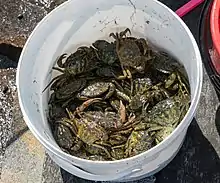Crab mentality
Crab mentality, also known as crab theory,[1][2] crabs in a bucket[lower-alpha 1] mentality, or the crab-bucket effect, is a way of thinking best described by the phrase "if I can't have it, neither can you".[3] It is a term originated by Filipino journalist and writer Ninotchka Roska in a 1987 interview published in the Philippine News.

The metaphor is derived from anecdotal claims about the behavior of crabs when they are trapped in a bucket: while any one crab can easily start to climb out,[4] it will nonetheless be pulled back in by the others, ensuring the group's collective demise.[5][6][7]
The analogous theory in human behavior is that members of a group will attempt to reduce the self-confidence of any member who achieves success beyond the others, out of envy, jealousy, resentment, spite, conspiracy, or competitive feelings, to halt their progress.[8][9][10][11] The same claims about behaviour are embodied in the phrase tall poppy syndrome.
Note
- also barrel, basket, or pot
See also
References
- Mae Lentz, Ella (2006). "The Crab Theory Revisited". YouTube. Archived from the original on 2020-11-27. Retrieved November 4, 2020.
- Henry, Elizabeth. "FAQ: Crab Theory". LibGuides.
- L. Douglas Wilder (October 1, 2015). Son of Virginia: A Life in America's Political Arena. Lyons Press. p. 185. ISBN 978-1-4930-1952-6.
- Low Robin Boon Peng (2016). Good Intentions Are Not Enough: Why We Fail At Helping Others. World Scientific. p. 104. ISBN 978-981-320-059-3.
- Sudipta Sarangi (April 1, 2013). "Capturing Indian 'Crab' Behaviour". The Hindu. Retrieved December 1, 2015.
- Miller, Carliss D. (January 2015). "A Phenomenological Analysis of the Crabs in the Barrel Syndrome". Academy of Management Proceedings. 2015 (1): 13710. doi:10.5465/AMBPP.2015.13710abstract.
- Adams, Frank Patrick (December 2019). Does the Crab Theory Hold Water? Investigating Intragroup Discriminatory Attitudes within the Deaf Community (PDF) (PhD). Gallaudet University. OCLC 1226710162.
- Manuel B. Dy (March 3, 1994). Values in Philippine Culture and Education. Council for Research in Values and Philosophy. p. 40. ISBN 978-1-56518-041-3.
- Herbert A. Leibowitz (December 31, 1994). Parnassus: Twenty Years of Poetry in Review. University of Michigan Press. p. 262. ISBN 978-0-472-06577-6.
- Albert Shanker (June 19, 1994). "Where We Stand: The Crab Bucket Syndrome". The New York Times. Retrieved December 1, 2015.
- David, E. J. R. (2013). Brown Skin, White Minds: Filipino / American Postcolonial Psychology. Charlotte, NC: Information Age Publishing. p. 119. ISBN 978-1-62396-209-8.
Further reading
- Aydin, Gizem Zevde; Oğuzhan, Gülpembe (2019). "The 'Crabs in a Bucket' Mentality in Healthcare Personnel: A Phenomenological Study". Hitit Üniversitesi Sosyal Bilimler Enstitüsü Dergisi. 12 (2): 618–630.
- Caples, Ceo (14 February 2018). "Does the 'Crabs in a Bucket Syndrome' still exist?". Medium.
- Bergthold, Linda (1984). "Crabs in a Bucket: The Politics of Health Care Reform in California". Journal of Health Politics, Policy and Law. 9 (2): 203–222. doi:10.1215/03616878-9-2-203. PMID 6386960.
- Sampath, Niels (June 1997). "'Crabs in a bucket': Reforming male identities in Trinidad". Gender & Development. 5 (2): 47–54. doi:10.1080/741922352. PMID 12292616.
- Klein, Alan (2020). "'Crabs in a Bucket': Envy and Egalitarianism in a Lakota World". Lakota Hoops. pp. 156–173. doi:10.36019/9781978804081-008. ISBN 978-1-9788-0408-1. S2CID 225035235.
- Bulloch, Hannah C. M. (April 2017). "Ambivalent moralities of cooperation and corruption: Local explanations for (under)development on a Philippine island". The Australian Journal of Anthropology. 28 (1): 56–71. doi:10.1111/taja.12173.
- Thibodeau, Regan (2019). Dynamics of Deaf Leadership: A Theoretical Model (Thesis). OCLC 1109395250.